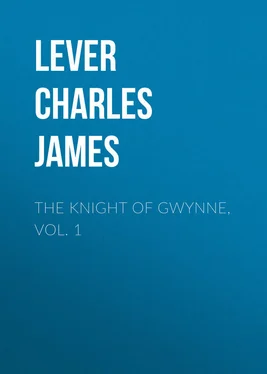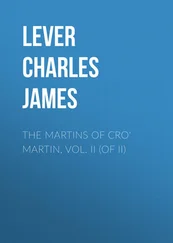Charles Lever - The Knight Of Gwynne, Vol. 1
Здесь есть возможность читать онлайн «Charles Lever - The Knight Of Gwynne, Vol. 1» — ознакомительный отрывок электронной книги совершенно бесплатно, а после прочтения отрывка купить полную версию. В некоторых случаях можно слушать аудио, скачать через торрент в формате fb2 и присутствует краткое содержание. Жанр: foreign_antique, foreign_prose, на английском языке. Описание произведения, (предисловие) а так же отзывы посетителей доступны на портале библиотеки ЛибКат.
- Название:The Knight Of Gwynne, Vol. 1
- Автор:
- Жанр:
- Год:неизвестен
- ISBN:нет данных
- Рейтинг книги:3 / 5. Голосов: 1
-
Избранное:Добавить в избранное
- Отзывы:
-
Ваша оценка:
- 60
- 1
- 2
- 3
- 4
- 5
The Knight Of Gwynne, Vol. 1: краткое содержание, описание и аннотация
Предлагаем к чтению аннотацию, описание, краткое содержание или предисловие (зависит от того, что написал сам автор книги «The Knight Of Gwynne, Vol. 1»). Если вы не нашли необходимую информацию о книге — напишите в комментариях, мы постараемся отыскать её.
The Knight Of Gwynne, Vol. 1 — читать онлайн ознакомительный отрывок
Ниже представлен текст книги, разбитый по страницам. Система сохранения места последней прочитанной страницы, позволяет с удобством читать онлайн бесплатно книгу «The Knight Of Gwynne, Vol. 1», без необходимости каждый раз заново искать на чём Вы остановились. Поставьте закладку, и сможете в любой момент перейти на страницу, на которой закончили чтение.
Интервал:
Закладка:
“It will be hard, however,” thought he, “but some inducement may be found to tempt a man whose house and habits evidence such a taste for enjoyment; he must have ambitions of one kind or other, and if not for himself, his son, at least, must enter into his calculations. Your ascetic or your anchorite may be difficult to treat with, but show me the man with a good cook, a good stable, a good cellar, and the odds are there is a lurking void somewhere in his heart, to discover which is to have the mastery over him forever.” Such were the conclusions the young aide-de-camp came to after long and mature thought, nor were they very unnatural in one whose short experience of life had shown him few, if any, exceptions to his theory. He deemed it possible, besides, that, although the Knight’s politics should incline to the side of Opposition, there might be no very determined or decided objection to the plans of Government, and that, while proof against the temptations of vulgar bribery, he might be won over by the flatteries and seductions of which a Ministry can always be the dispensers. To open the negotiation with this view was then the great object with Forester, to sound the depth of the prejudices with which he had to deal, to examine their bearings and importance, to avoid even to ruffle the slightest of national susceptibilities, and to make it appear that, while Government could have little doubt of the justice of their own views, they would not permit a possibility of misconstruction to interfere with the certainty of securing the adhesion of one so eminent and influential as the Knight of Gwynne.
The old adage has commemorated the facility of that arithmetic which consists in reckoning “without one’s host,” and there are few men of warm and generous temperament who have not fallen, some time or other, into the error. Forester was certainly not the exception; and so thoroughly was he imbued with the spirit of his mission, and so completely captivated by the force of his own argument, that he walked up and down the ample apartment, repeating aloud, in broken and disjointed sentences, some of those irrefutable positions and plausible inducements by which he speculated on success. It was already the dusk of the evening, the short hours of a wintry day had hurried to a close, and, except where the bright glare of the wood fire was reflected on the polished oaken floor, all was shrouded in shadow within that spacious library. Now pushing aside some great deep-cushioned chair, now removing from his path the projecting end of a table, Forester succeeded in clearing a space in which, as he walked, he occasionally gave vent to such reflections as these: —
“The necessities of the Empire, growing power and influence of England, demand a consolidation of her interests and her efforts – this only to be effected by the Act of Union – an English Parliament, the real seat of legislation, and, as such, the suitable position for you, Sir Knight, whose importance will now increase with the sphere in which you exercise your abilities. I do not venture,” said he, aloud, and with a voice attuned to its most persuasive accents, – “I do not venture to discuss with you a question in which your opportunities and judgment have given you every advantage over me; I would merely direct your attention to those points on which my relative, Lord Castlereagh, founds the hopes of obtaining your support, and those views by which, in the success of the measure, a more extended field of utility will open before you. If I do not speak more fully on the gratitude which the Ministry will feel for your co-operation, and the pledges they are most ready and willing to advance, it is because I know – that is, I am certain that you – in fact, it is the conviction that – in short – ”
“In short, it is because bribery is an ugly theme, sir, and, like a bad picture, only comes out the worse the more varnish you lay on it.” These words, uttered in a low, solemn voice from a corner of the apartment, actually stunned Forester, who now stood peering through the gloom to where the indistinct figure of a man was seen seated in the recess of a large chair.
“Excuse me, Captain Forester,” said he, rising, and coming forward with his hand out; “but it has so seldom been my fortune to hear any argument in defence of this measure that I could not bring myself to interrupt you before. Let me, however, perform a more pleasing task, in bidding you welcome to Gwynne Abbey. You slept well, I trust, for I left you in a happy unconsciousness of this world and its cares.” It required all Forester’s tact to subdue the uncomfortable sensations his surprise excited, and receive the proffered welcome with becoming cordiality. But in this he soon succeeded, not less from his own efforts than from the easy and familiar tone of the speaker. “I have to thank you for a very pleasant note you were kind enough to bring me,” continued he, as he seated himself beside the fire. “And how have you left Dublin? Is the popular excitement as great as some weeks ago? or are the people beginning to see that they have nothing to say to a measure which, like venison and turtle, is a luxury only to be discussed by their betters?”
“I should say that there is more of moderation in the tone of all parties of late,” said Forester, diffidently, for he felt all the awkwardness of alluding to a topic in which his own game had been so palpably discovered.
“In that case, your friends have gained the victory. Patriotism, as we call it in Ireland, requires to be fed by mob adulation; and when the ‘canaille’ get hoarse, their idols walk over to the Treasury benches. – But there ‘s the bell to dress; and I may as well tell you that we are the models of punctuality in this house, and you have only fifteen minutes for your toilet.” With these words the old gentleman arose and strode out of the room, while Forester hastened, on his side, to prepare for the dinner-hour.
When the aide-de-camp had accomplished his dressing, he found the party at table, where a vacant place was left for himself at the right hand of the host.
“We gave you three minutes’ grace, Captain Forester. I knew a candidate lose his election in the county by very little more,” – and here he dropped his voice to a whisper, only audible to Forester, – “and I’d rather contract to keep the peace in a menagerie full of tigers than hold in check the passions of twenty hungry fox-hunters while waiting for dinner.”
Forester cast his eyes over the table, and thought he perceived that his delay had not prepossessed the company in his favor. The glances which met his own round the board bore an expression of very unmistakable dissatisfaction, and although the conversation was free and unrestrained, he felt all the awkwardness of his position.
There was at the time we speak of – has it quite disappeared even yet? – a very prevalent notion in most Irish circles that Englishmen in general, and English officials in particular, assumed airs of superiority over the natives of the country, treating them as very subordinate persons in all the relations in which good-breeding and social intercourse are concerned; and this impression, whether well or ill founded, induced many to suspect intentional insult in those chance occurrences which arise out of thoughtlessness and want of memory.
If the party now assembled manifested any portion of this feeling, it was not sufficient to interrupt the flow of conversation, which took its course in channels the most various and dissimilar. The individuals were intimate, or, at least, familiar with each other, and, through all the topics of hunting, farming, politics, and horse-racing, ran a tone of free and easy raillery that kept a laugh moving up and down the table, or occasionally occupying it entirely. The little chill which marked Forester’s first entrance into the room wore off soon, and ere the dinner was over he had drunk wine with nearly every man of the party, and accepted invitations to hunt, course, and shoot in at least a dozen different quarters. Lionel Darcy’s friend, as he was soon known to be, was speedily made the object of every attention and civility among the younger members of the company, while even the older and less susceptible reserved their judgments on one they had at first received with some distrust.
Читать дальшеИнтервал:
Закладка:
Похожие книги на «The Knight Of Gwynne, Vol. 1»
Представляем Вашему вниманию похожие книги на «The Knight Of Gwynne, Vol. 1» списком для выбора. Мы отобрали схожую по названию и смыслу литературу в надежде предоставить читателям больше вариантов отыскать новые, интересные, ещё непрочитанные произведения.
Обсуждение, отзывы о книге «The Knight Of Gwynne, Vol. 1» и просто собственные мнения читателей. Оставьте ваши комментарии, напишите, что Вы думаете о произведении, его смысле или главных героях. Укажите что конкретно понравилось, а что нет, и почему Вы так считаете.












